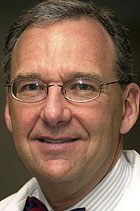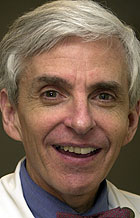The Children’s Discovery Institute has been given the go-ahead to begin research within its four centers after its board approved an ambitious $5.3 million annual funding proposal.
The institute, launched in January, is a novel collaboration between the School of Medicine and St. Louis Children’s Hospital to fund research in four specific areas of childhood disease and accelerate cures.
Since silent fundraising began in November 2004, more than $103 million of the targeted $125 million has been raised.

To facilitate research and funding distribution, the board appointed Alan L. Schwartz, Ph.D., M.D., as its executive director, and Jonathan D. Gitlin, M.D., as its scientific director. In addition, it appointed a scientific advisory board made up of six distinguished scientists from Washington University and other nationally renowned institutions.
“This is an extraordinarily exciting time and opportunity for both of our institutions — Washington University and St. Louis Children’s Hospital — to galvanize the resources which exist and direct those to discovering the basis and approaches to curing major children’s health issues,” said Schwartz, the Harriet B. Spoehrer Professor of Pediatrics, chair of the School of Medicine Department of Pediatrics and Children’s Hospital pediatrician-in-chief.
The $5.3 million in annual funding will be used to recruit between eight and 10 scientists for the four centers: the McDonnell Children’s Cancer Center; the Children’s Center for Musculoskeletal Diseases; the Children’s Center for Lung and Respiratory Disorders; and the Children’s Center for Congenital Heart Disease.

The advisory board will serve as the financial gatekeeper to research funding for interested scientists. Its six members include four Washington University professors and two from other institutions. Three are Howard Hughes Medical Institute (HHMI) investigators, and three are women.
“We are dealing here with the future of medicine, and the Children’s Discovery Institute is an important opportunity to cultivate role models for young scientists,” said Gitlin, the Helene B. Roberson Professor of Pediatrics, professor of pathology and immunology and of genetics and director of genetics and genomic medicine at Children’s Hospital.
The advisory board members are Susan K. Dutcher, Ph.D., professor and interim head, Department of Genetics, School of Medicine; Sarah C.R. Elgin, Ph.D., HHMI professor of biology, WUSTL; Robert P. Mecham, Ph.D., the Alumni Endowed Professor of Cell Biology and Physiology, School of Medicine; Steven L. Teitelbaum, M.D., the Wilma and Roswell Messing Professor of Pathology, School of Medicine; Michael J. Welsh, M.D., the Roy J. Carver Professor of Medicine and Cell Biology and HHMI Investigator, University of Iowa; and Huda Y. Zoghbi, M.D., professor of pediatrics, of molecular and human genetics, of neurology and neuroscience and HHMI Investigator, Baylor College of Medicine.
The team approach seeks to bring together scientists across specialties with the belief that this broad spectrum will lead to more creative pathways to finding cures. Children’s Hospital President Lee Fetter said he believes this will attract some of the most talented researchers in the world.
“In a few years, scientists are going to hear about this novel approach to doing research at Washington University and think, ‘Wow, I want to be a part of this team that’s working on collaborative investigations into the genetic basis of childhood disease,'” Fetter said.
As scientific director, Gitlin will chair the advisory board, coordinate each center’s investigator teams and otherwise serve as a catalyst for the development of ideas within each of the four centers.
Gitlin expects to present proposals from Washington University faculty to the advisory board for consideration by October, with funding awards to begin in early 2007.
“We’re getting closer to realizing our dream,” Gitlin said. “What you try to bring to a patient’s bedside is hope. It lies within our grasp in the next quarter of this century to rid ourselves of a lot of childhood diseases, and that’s the greatest hope as a pediatrician that I have for my patients.”